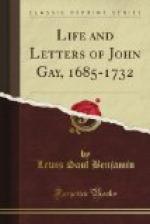Whatever the true story, the day after the Duchess’s interview with the King (February 27th, 1729), William Stanhope, the Vice-Chamberlain, carried to the Duchess a verbal message not to come to Court; whereupon she sat down and wrote a letter for him to take to his Majesty. “The Duchess of Queensberry,” so ran her reply, “is surprised and well pleased that the King hath given her so agreeable a command as to stay from Court, where she never came for diversion, but to bestow a great civility on the King and Queen; she hopes by such an unprecedented order as this is, that the King will see as few as he wishes at his Court, particularly such as are to think or speak truth. I dare not do otherwise, and ought not, nor could have imagined that it would not have been the very highest compliment that I could possibly pay the King to endeavour to support truth and innocence in his house, particularly when the King and Queen both told me that they had not read Mr. Gay’s play. I have certainly done right, then, to stand by my own words rather than his Grace of Grafton’s, who hath neither made use of truth, judgment, nor honour, through this whole affair, either for himself or his friends."[8] Stanhope read this, and begged the Duchess to reflect before sending it. She consented to write another letter, did so, and handed it to him. He chose the first. The Duke of Queensberry supported his wife, and although the King pressed him to remain, resigned his office of Admiral of Scotland—though Gay wrote to Swift,[9] “this he would have done, if the Duchess had not met with this treatment, upon account of ill-usage from the Ministers,” and that this incident “hastened him in what he had determined.” The affair created an immense sensation in Court circles. “The Duchess of Queensberry is still the talk of the town. She is going to Scotland,” Mrs. Pendarves wrote to Mrs. Anne Granville, March 14th, 1729.... “My Lady Hervey told her the other day that ’now she was banished, the Court had lost its chief ornament,’ the Duchess replied, ‘I am entirely of your mind.’ It is thought my Lady Hervey spoke to her with a sneer, if so, her Grace’s answer was a very good one."[10]




